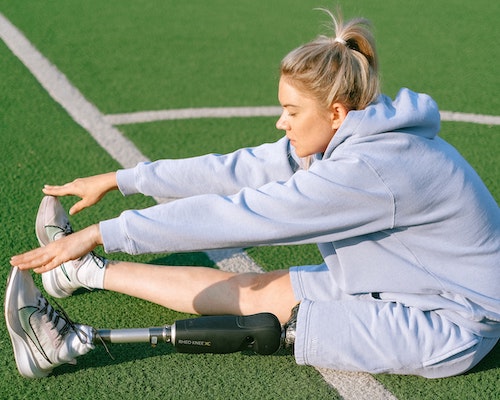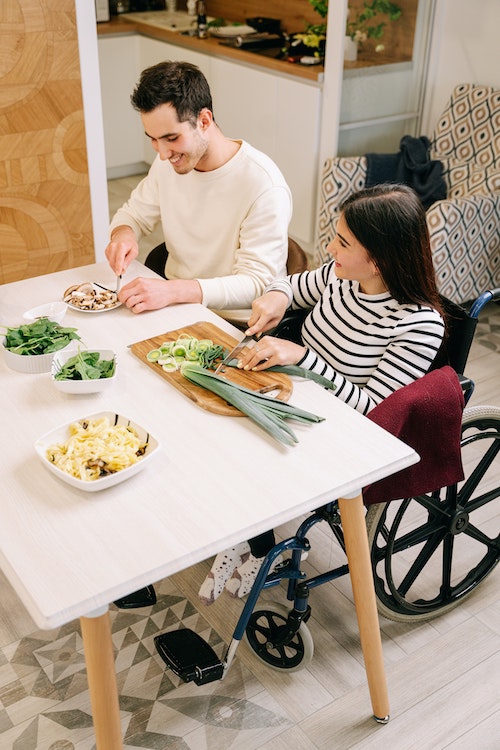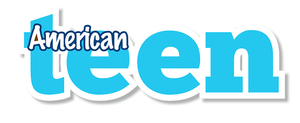By Marissa Mitchell
Disabilities are physical or mental conditions that can limit a person’s movements, senses, or activities. There are various disabilities you can be born with or develop over time, that can affect your vision, hearing, limbs, neurology, and so on.
July was “disability pride” or “disability awareness” month which has been slowly gaining more recognition. It’s an opportunity for disabled people to celebrate all of the obstacles they have overcome and reclaim their visibility. The disabled community is unfortunately not often featured in the news or media.
 First experience
First experience
I can remember a time when there was a deaf student in my class for most of middle school, and our teacher suggested all of us auditory students learn the alphabet and a handful of words or phrases in American Sign Language (ASL) in order to communicate with her, as she was our fellow classmate. It was a great idea and it was pretty easy to do. We all were excited to meet her, her interpreter, and to learn a little bit of ASL.
However, once she was no longer in our class and we all went on to high school and college, we kind of forgot about the whole experience. Almost to the point where I just never thought about ASL again or those who have to rely on it. It wasn’t until almost two decades later, when me and a friend traveled to Washington D.C. that I was reminded….
Learning to communicate
When we got to D.C, we discovered that our hotel was attached to a Deaf & Blind school. At first, we assumed it wasn’t a big deal since the folks at the front desk were able to help us just fine. But we noticed that almost every hotel guest was hearing-impaired or vision-impaired. It was a foreign environment to us in which we were the minority. We also noticed the servers, housekeepers, staffers… couldn’t understand us when we would request things. They were ASL only, and since we weren’t fluent in ASL we were not able to communicate with them. So, we would have to go back and forth to the front desk to get assistance. We complained amongst ourselves that we felt super ignored.
The first day of our stay, we were frustrated that we weren’t being acknowledged or accommodated the way we needed. By the second day of our stay, after our naivety passed, my friend and I looked at each other while we both had the same epiphany, and we yelled out: “The way we feel right now, is how deaf and blind people feel ALL the time!” It was our moment of enlightenment about an otherwise forgotten about group of people.
 A flood of examples came to mind of how they are often excluded in the typical environments that cater to the hearing and sighted, such as many restaurants, hotels, stores, theatres...Not to mention, being rarely included on-screen or on-air in the entertainment industry. Though technology has helped bridge gaps in accessibility in the classroom, there is a lot more that we could be doing to help disabled people feel more included and accommodated in everyday life.
A flood of examples came to mind of how they are often excluded in the typical environments that cater to the hearing and sighted, such as many restaurants, hotels, stores, theatres...Not to mention, being rarely included on-screen or on-air in the entertainment industry. Though technology has helped bridge gaps in accessibility in the classroom, there is a lot more that we could be doing to help disabled people feel more included and accommodated in everyday life.
Waking up
The obvious consequence of having a disability is the physical/biological effects of the disability, and that cannot always be remedied. However, we are able to change or prevent the social consequences. Us able-bodied folks rarely think about the lives of people who have disabilities. Unfortunately, the lack of consideration, for people with disabilities has contributed to a society where disabled people are ignored. The lack of awareness and inclusion makes it harder for disabled people to function in a society built for the able-bodied. When is the last time you watched a movie where a blind person was the leading star? When is the last time you saw a restaurant help a deaf person place their order? When was the last time you had a co-worker with a disability? These are not coincidences. Oftentimes, people with disabilities are excluded from everyday life, simply because we don’t go the extra mile to include them.
By not hiring disabled people, casting them in movies, or creating ADA-accessible environments, we are choosing to make life harder for disabled people. While we wait for those sweeping changes, you can always start with something small in the meantime: familiarize yourself with common tools and accommodations so you can be a resource to anyone that needs your help, familiarize yourself with ADA-friendly verbiage so you don’t offend anyone, don’t assume someone with a disability is less capable or less valuable than you, seek to have a diverse group of able and disabled friends, never make jokes at the expense of the disabled person, always seek to uplift and empower them.
Marissa Mitchell is a 27-year-old writer who is finishing doctoral school this year. She is also an insurance adjuster and a small business owner in Southern Arizona.
